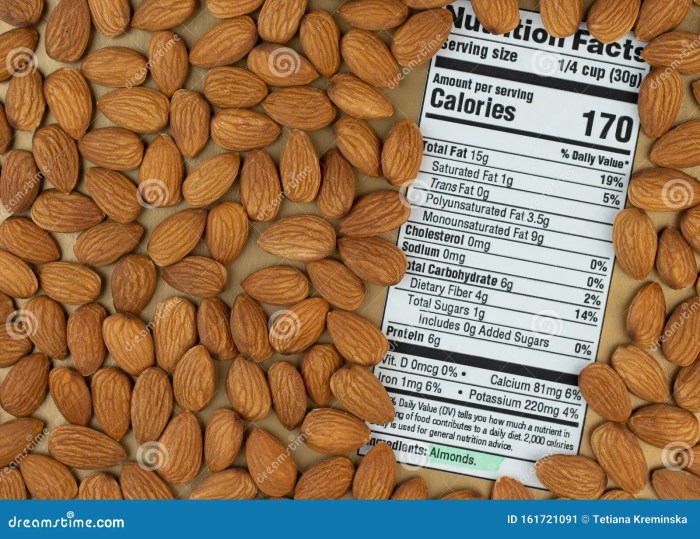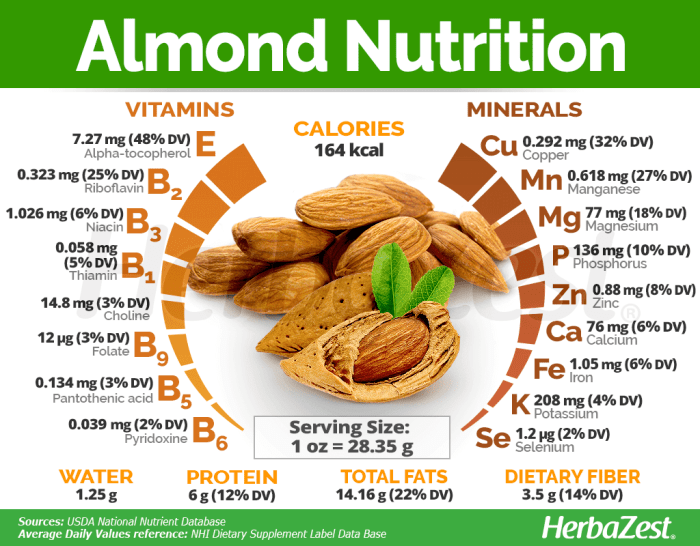Health Benefits of Consuming 10 Almonds: 10 Almonds Nutrition Facts

10 almonds nutrition facts – A handful of almonds—around 10—packs a surprising nutritional punch, offering a wealth of health benefits beyond just a satisfying snack. These benefits stem from the rich blend of vitamins, minerals, healthy fats, and fiber found within these little nuts. Regular consumption can contribute positively to various aspects of your well-being, from maintaining a healthy heart to managing your weight and blood sugar levels.Almonds are a nutritional powerhouse, and their impact on your health is multifaceted.
The combination of monounsaturated fats, fiber, vitamin E, and magnesium all play crucial roles in promoting various health benefits. Let’s delve into the specifics.
Ten almonds offer a nutritional punch, providing healthy fats and protein. However, if you’re watching your calorie intake, consider the contrast: checking the alabama-style white barbecue sauce nutrition facts might help you balance your meal choices. Returning to almonds, remember their fiber content contributes to satiety, making them a smart snack choice compared to some higher-calorie options.
Heart Health Benefits of Almonds
The heart-healthy benefits of almonds are primarily attributed to their high monounsaturated fat content and their rich supply of vitamin E and magnesium. Monounsaturated fats help lower LDL (“bad”) cholesterol levels, reducing the risk of heart disease. Vitamin E acts as a potent antioxidant, protecting cells from damage caused by free radicals, which can contribute to cardiovascular issues. Magnesium plays a vital role in regulating blood pressure.
Studies have shown a correlation between regular almond consumption and improved cardiovascular markers. For example, a study published in the
Journal of Nutrition* found that incorporating almonds into a diet reduced LDL cholesterol levels in participants.
Almonds and Weight Management
Despite their calorie density, almonds can actually aid in weight management. Their high fiber and protein content contribute to increased satiety, meaning you feel fuller for longer after consuming them. This can help reduce overall calorie intake throughout the day, preventing weight gain or promoting weight loss. The healthy fats in almonds also contribute to feeling full and satisfied.
Furthermore, the fiber in almonds promotes healthy digestion and regularity. This helps maintain a balanced gut microbiome, potentially impacting weight management positively. For instance, a study published in the
American Journal of Clinical Nutrition* suggested that incorporating almonds into a weight-loss diet helped participants feel more satisfied and adhere to their calorie goals more effectively.
Blood Sugar Control with Almonds
Almonds’ impact on blood sugar control is linked to their fiber content and low glycemic index (GI). Fiber slows down the absorption of sugar into the bloodstream, preventing sharp spikes in blood glucose levels. The low GI of almonds means they release sugar into the bloodstream gradually, preventing rapid fluctuations that can be harmful to individuals with diabetes or those at risk of developing it.
The magnesium content also contributes to better insulin sensitivity, improving the body’s ability to utilize glucose effectively. A meta-analysis of several studies demonstrated that regular consumption of almonds can improve glucose control and insulin sensitivity in individuals with type 2 diabetes.
Summary of Health Benefits from 10 Almonds, 10 almonds nutrition facts
The following points summarize the key health benefits associated with consuming approximately 10 almonds:
- Improved Heart Health: Monounsaturated fats, vitamin E, and magnesium in almonds contribute to lower LDL cholesterol, reduced oxidative stress, and regulated blood pressure, reducing the risk of cardiovascular diseases.
- Enhanced Weight Management: High fiber and protein content promote satiety, reducing overall calorie intake and aiding in weight control or loss. Healthy fats contribute to satiety as well.
- Better Blood Sugar Control: Fiber and low glycemic index slow down sugar absorption, preventing blood glucose spikes and promoting better insulin sensitivity.
Almonds in a Balanced Diet

Incorporating almonds into your daily diet can significantly boost your nutritional intake. While the benefits of 10 almonds are considerable, understanding how they compare to other nuts and how best to integrate them into a balanced eating plan is crucial for maximizing their health impact. This section will explore the nutritional profile of almonds alongside other popular nuts, and provide practical examples of how to enjoy them as part of a healthy diet.
Almonds offer a unique nutritional profile, rich in healthy fats, protein, and fiber. However, other nuts also provide valuable nutrients, making a comparison useful for informed dietary choices. The following table highlights the key differences and similarities between almonds, walnuts, and cashews, focusing on macronutrients per approximately 30g serving (which is roughly equivalent to 10-15 almonds, depending on size).
Nutritional Comparison of Almonds, Walnuts, and Cashews
| Nut Type | Protein (g) | Fat (g) | Fiber (g) |
|---|---|---|---|
| Almonds | 6-7 | 14-16 | 3-4 |
| Walnuts | 4-5 | 18-20 | 2-3 |
| Cashews | 5-6 | 12-13 | 1-2 |
As the table shows, almonds provide a good balance of protein, healthy fats, and fiber, though walnuts are higher in fat and cashews offer slightly less fiber. The differences are subtle, but the overall nutritional value of all three nuts makes them valuable additions to a healthy diet.
Incorporating Almonds into a Balanced Diet
Including 10 almonds in your daily diet can contribute significantly to your overall health and well-being. Their nutritional density supports various bodily functions and contributes to satiety, aiding in weight management.
Here are some simple ways to incorporate 10 almonds into your meals:
For example, you could add them to your morning yogurt parfait, sprinkle them over your salad for added crunch and healthy fats, or include them in homemade trail mix for a convenient and nutritious snack. Adding them to oatmeal provides a boost of protein and healthy fats, contributing to sustained energy levels throughout the morning. A handful can also be a satisfying addition to a mid-afternoon snack alongside fruit, preventing overindulgence in less healthy options later in the day.
FAQs
Are almonds good for weight loss?
While almonds are calorie-dense, their healthy fats and fiber can contribute to satiety, potentially aiding in weight management when consumed as part of a balanced diet. They shouldn’t replace other healthy food groups, however.
Can I eat more than 10 almonds a day?
Moderation is key. While 10 almonds offer significant benefits, exceeding recommended serving sizes can lead to excessive calorie intake. Listen to your body and adjust accordingly.
Are almonds suitable for people with nut allergies?
No. Individuals with nut allergies should strictly avoid almonds due to the risk of severe allergic reactions. Always check food labels carefully.
How should I store almonds to maintain their freshness?
Store almonds in an airtight container in a cool, dark, and dry place to preserve their freshness and prevent rancidity.
